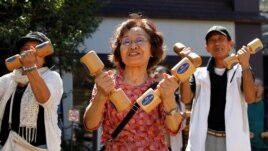22 September, 2017
Over 200 people gathered recently on a hot day at a shrine in downtown Tokyo.
Many in the crowd were older adults. Some chewed gum and lifted dumbbells. The weight lifting was meant to increase their strength and balance.
The elderly Japanese had gathered for an event to mark Respect for the Aged Day.

Elderly and middle-aged people exercise with wooden dumbbells during a health promotion event to mark Japan's "Respect for the Aged Day" at a temple in Tokyo's Sugamo district, September 18, 2017. REUTERS/Toru Hanai
The observance comes at a time when Japan's population is aging. The number of people aged 65 and over has grown to 27.7 percent of the population. That information comes from government reports.
The number of elderly Japanese who still work has also hit a new high. These numbers are evidence of efforts by the government and private businesses to keep the elderly at work.
The government estimates, released on Monday, are a sign of the problems resulting from a declining birthrate. Now, there are around 1.45 births for every woman in Japan. Many economists say a developed country needs a birthrate above 2 births per woman to prevent its population from shrinking.
Japan has struggled with a declining workforce for many years. The percentage of elderly people is among the highest in the Group of Seven Nations. Italy, for example, has an elderly population of around 23 percent. Germany has around 21.5 percent, while France has 19.7 percent.
In Japan, the government estimates that 35.14 million Japanese people are age 65 or older. 7.7 million of those men and women are still working.
For the first time, the number of Japanese aged 90 or older rose above two million.
Natsu Naruse joined the group exercise in Tokyo last week. She recently turned 100 years old.
"I think my children would have trouble," if I lived longer, she said.
I'm John Russell.
Stanley White and Kwiyeon Ha reported on this story for Reuters. John Russell adapted their report for Learning English. George Grow was the editor.
We want to hear from you. Write to us in the Comments Section.
_____________________________________________________________
Words in This Story
shrine – n. a place connected with a holy person or event where people go to worship : a place that people visit because it is connected with someone or something that is important to them
dumbbell – n. a short bar with weights at the ends that is used to make muscles stronger
chew – v. to bite on (something) repeatedly with the teeth
gum – n. a type of soft candy that you chew on but do not swallow
birthrate – n. a number that shows how many babies are born in a particular place or during a particular time